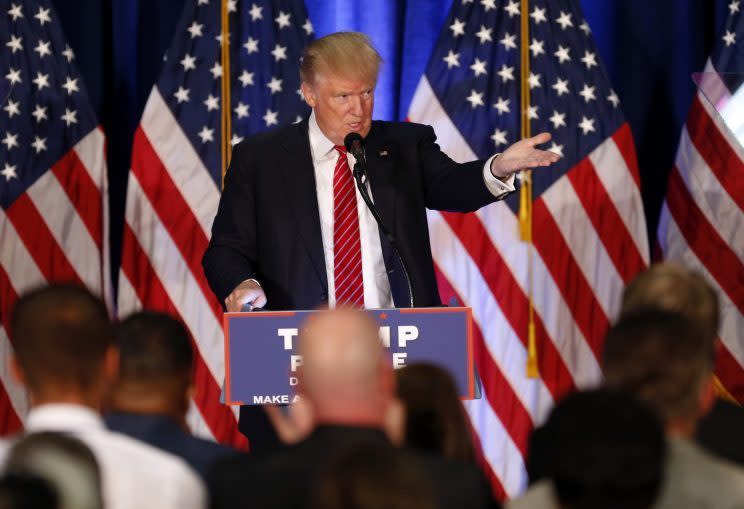Donald Trump calls for ‘extreme vetting’ of new immigrants
YOUNGSTOWN, Ohio — Donald Trump on Monday elaborated on his call for a ban on Muslims entering the United States, proposing a new ideological test for anyone seeking to enter the country. He vowed to block those who sympathize with extremist groups or don’t embrace American values.
Speaking in what is expected to be a hotly contested swing district in the battleground state of Ohio, the Republican presidential nominee said his administration would take on the “ideology of radical Islam” and stand up against the “oppression of women, gays and people of different beliefs.”
He cited a spate of recent terror attacks, including last year’s deadly shooting in San Bernardino, Calif., the Orlando nightclub shooting in June, and the massacres in Paris and Brussels. “The time is overdue to develop a new screening test for the threats we face today,” he said.
“I call it extreme vetting. Extreme, extreme vetting,” Trump declared.
The celebrity businessman turned presidential candidate offered no specifics on how exactly the proposed screenings would be administered. But he offered some criteria, including “screening out all members or sympathizers of terrorist groups” and those who have “hostile attitudes to our country and its principals,” including a belief that “Shariah law should supplant American law.”
“Those who do not believe in our Constitution, or who support bigotry and hatred, will not be admitted for immigration into the country,” Trump proclaimed. “Only those who we expect to flourish in our country and to embrace a tolerant American society should be issued immigrant visas.”
For the screenings to work, Trump said he would temporarily suspend immigration from “some of the most dangerous and volatile regions of the world” — a pledge he has made previously on the campaign trail. Critics have questioned whether Trump’s standards would include European countries like France and Germany that have suffered terror attacks, but the GOP nominee did not say which would be included. Instead, he said he would have to determine the regions “as soon as I take office.”

The speech, delivered before an invited audience at Youngstown State University, came as Trump struggles to regain momentum after a series of mostly self-inflicted controversies. Those include last week’s statements in which Trump repeatedly called President Obama the “founder of ISIS” and Hillary Clinton, his Democratic rival, “the co-founder.”
Trump, who had made similar remarks for the past few months, initially defended the comment — declining to tell conservative radio host Hugh Hewitt that he was speaking figuratively when offered the chance. But on Friday, he abruptly dialed back, insisting it was “sarcasm” that has been misreported by the media. In a rally later that day, he partially reversed himself again, telling supporters at a Pennsylvania rally that his comment “was not that sarcastic, to be honest with you.”
On Monday, Trump sought to clean up the remarks once again — saying the “Obama-Clinton foreign policy … unleashed ISIS.”
“The rise of ISIS is the direct result of policy decisions made by President Obama and Secretary of State Clinton,” Trump said. “Hillary Clinton’s policies launched ISIS onto the world.”
Trump also accused Clinton of lacking the “mental and physical stamina” to take on ISIS or any other challenge facing the country. At the same time, the GOP nominee cast himself as someone willing to ally with any country willing to take on radical terrorists, calling it an ideological struggle on par with the Cold War.
The GOP nominee specifically cited Russia as a potential ally he could work with — amid new criticism of his campaign chief’s ties to the Kremlin’s political interests. Democrats have further alleged that the Russian government may be behind the hacking of the Democratic National Committee’s servers to sway the campaign on his behalf.
“Any country that shares this goal will be our allies,” Trump declared. “We can never choose our friends, but we can never fail to recognize our enemies.”


